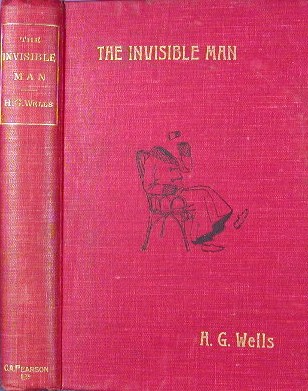Once again we return the origins of science fiction with another novel by Mr. Wells, The Invisible Man. Again, much like The Time Machine this story is rather short compared to much of my regular reading, but remains a frequently referenced classic of the science fiction genre. However, I must state that unlike The Time Machine, The Invisible Man hasn't had as wide an influence on the science-fiction genre and remains overshadowed by Wells's other works.
The plot follows the titular Invisible Man who enters the village of Iping one February day and takes up rooms at a local inn. He remains extremely aloof and becomes a subject of much curiosity and discussion among the people of Iping. Eventually the fact that the Invisible Man is, well, invisible comes to light and the Invisible Man (aka Griffin) goes on a crime spree. Eventually he flees further south in Sussex and the law is faced with the question of how to arrest an invisible man, if he even exists at all.
Overall I'd say the main problem with The Invisible Man is that our main character, Griffin, is pretty much an asshole, if not a clinical psychopath. Griffin only cares about his own needs and desires, constantly resorting to petty theft and intimidation to meet his needs of food, clothing, and shelter. Griffin goes so far as to plan a reign of terror which he will enforce by personally executing people who oppose him. Any sympathy for Griffin, as unlikely as that seems, is well and truly gone by the second half of the novel. I found it rather difficult to continue at points in the story simply because of Griffin's personality.
An argument could definitely be made that Wells is exploring how a lack of consequences affects people in his novel. Unfortunately if this was the goal of his novel it does not convey very well at all. What little glimpses we get of Griffin's personality before he takes the invisibility formula are not flattering. While the invisibility formula may have exacerbated Griffin's psychopathy, I think if he knew he could escape the consequences (invisible or not) he would have engaged in criminal acts anyway. We are left with an ambiguous ending where another character is slowly working on decoding Griffin's notes and he could use the information within for good or ill. However, the fact that this character keeps the fact that he has the notes a secret bodes poorly for future uses of Griffin's discoveries.
Overall I think The Invisible Man is one of the mediocre works of Wells. While it explores an (even then) old concept in a new way, any message on the ethical application of such a technology remains overshadowed by Griffin's psychopathy. Furthermore its influence on the genre is nowhere near the proportions of The Time Machine or War of the Worlds. I'd say even the more dedicated science-fiction readers can afford to skip this novel.
- Kalpar


No comments:
Post a Comment